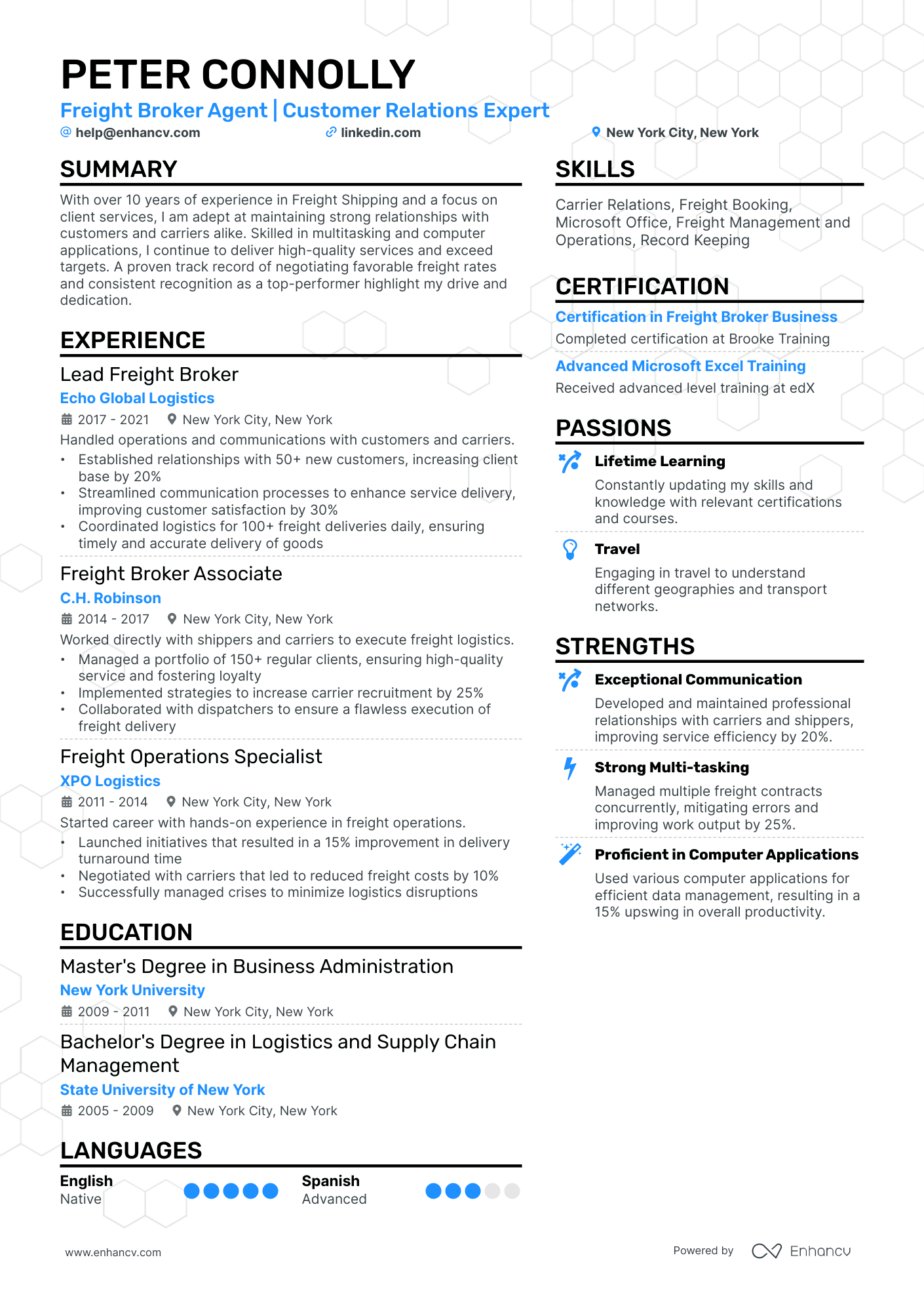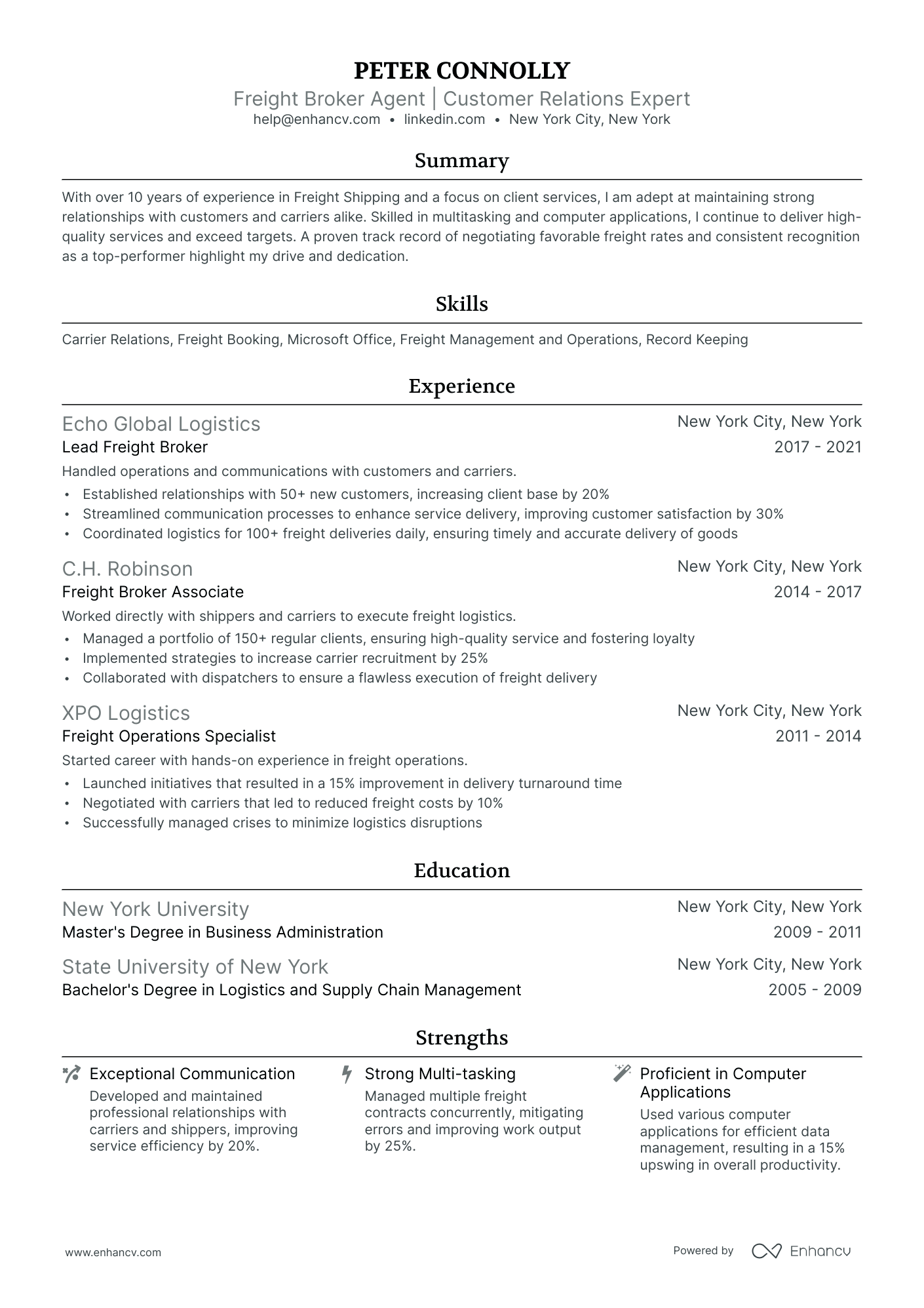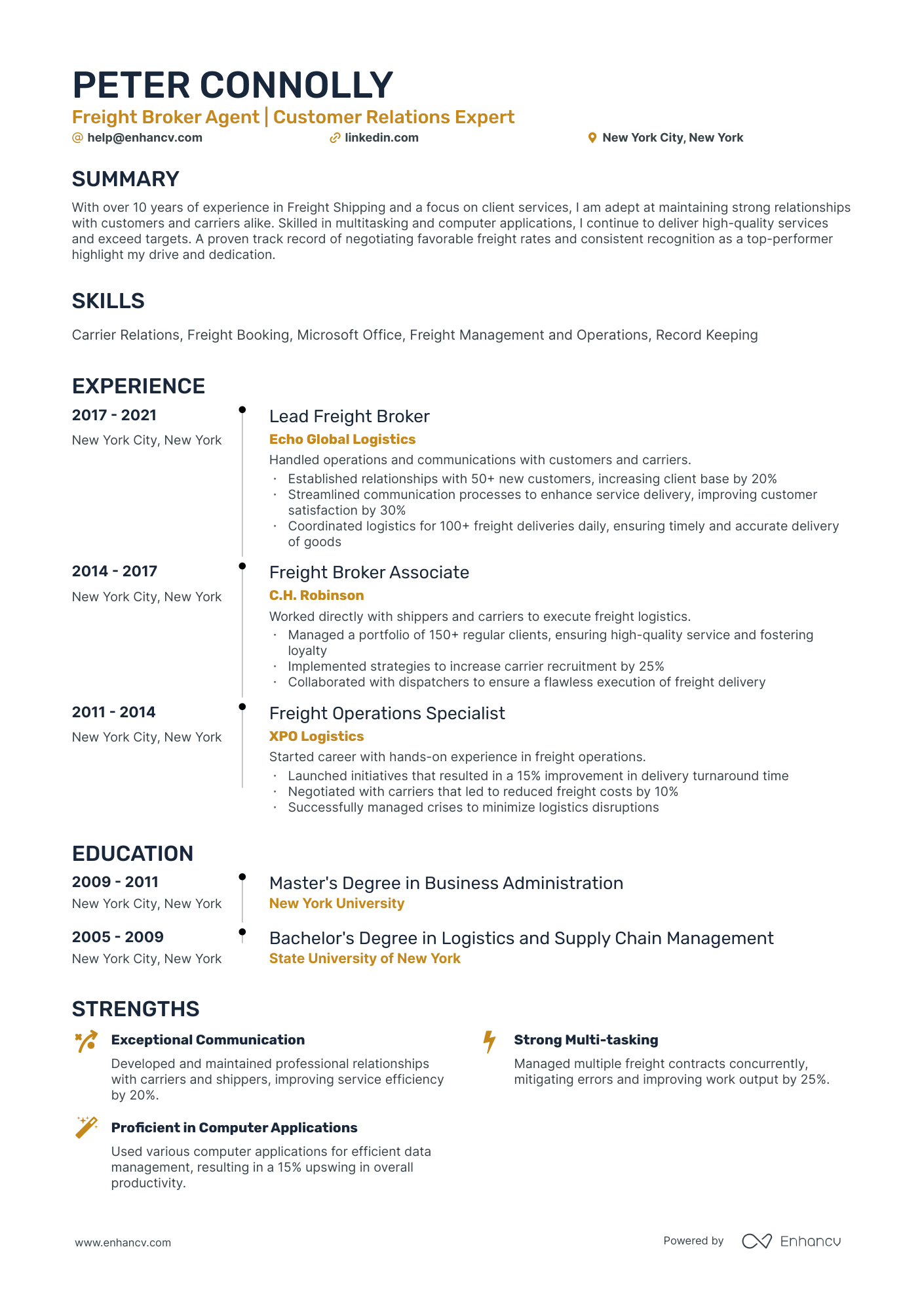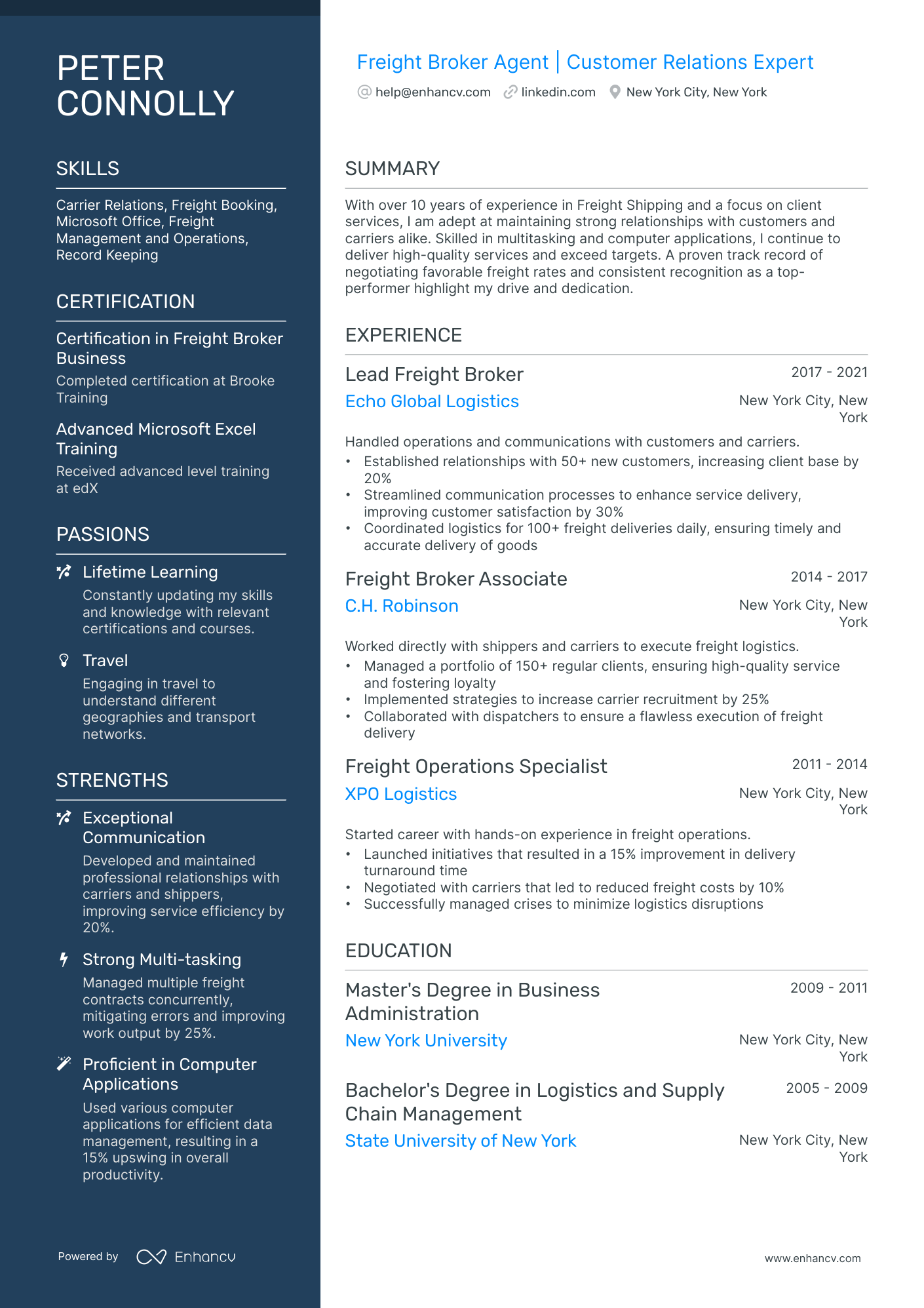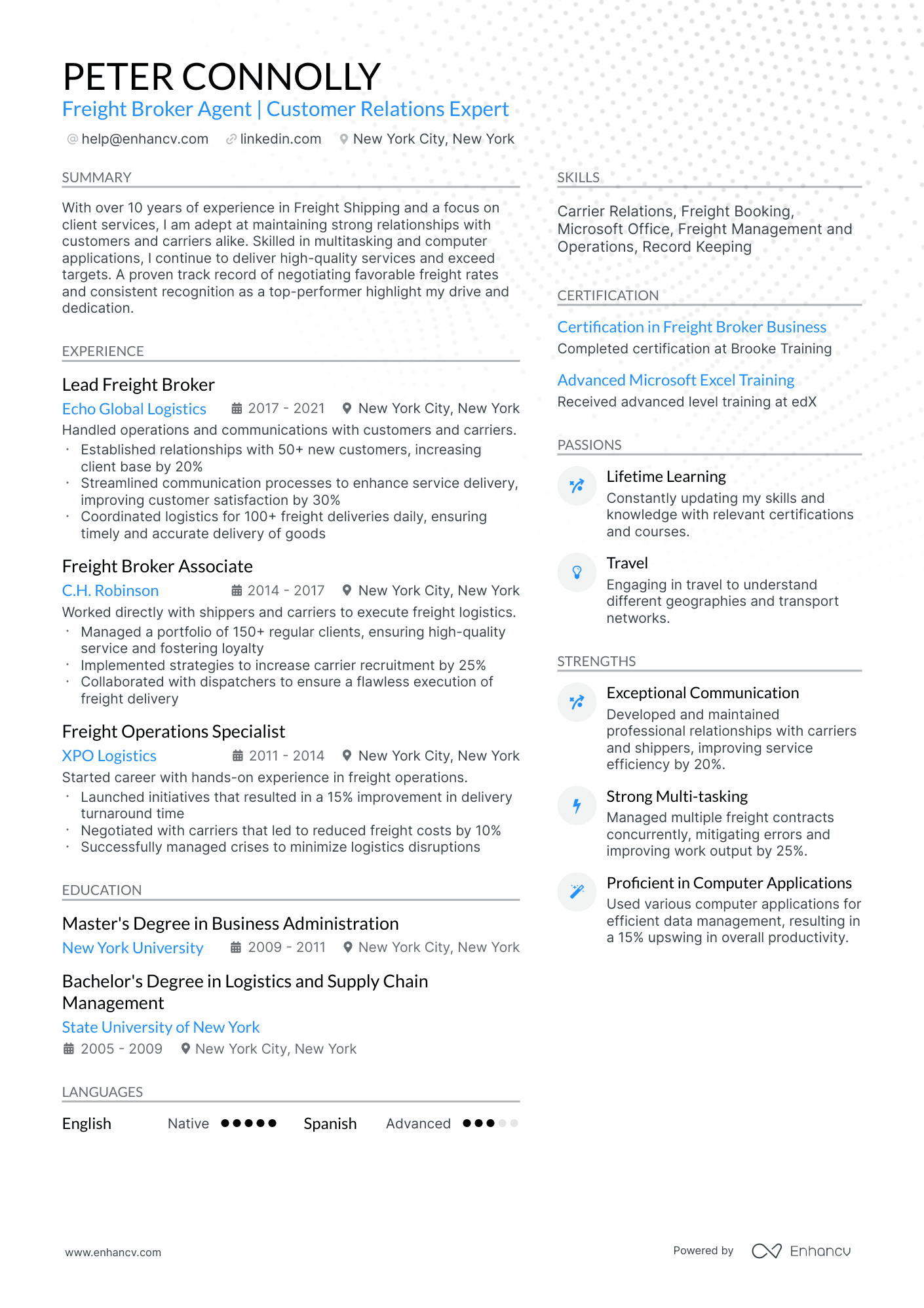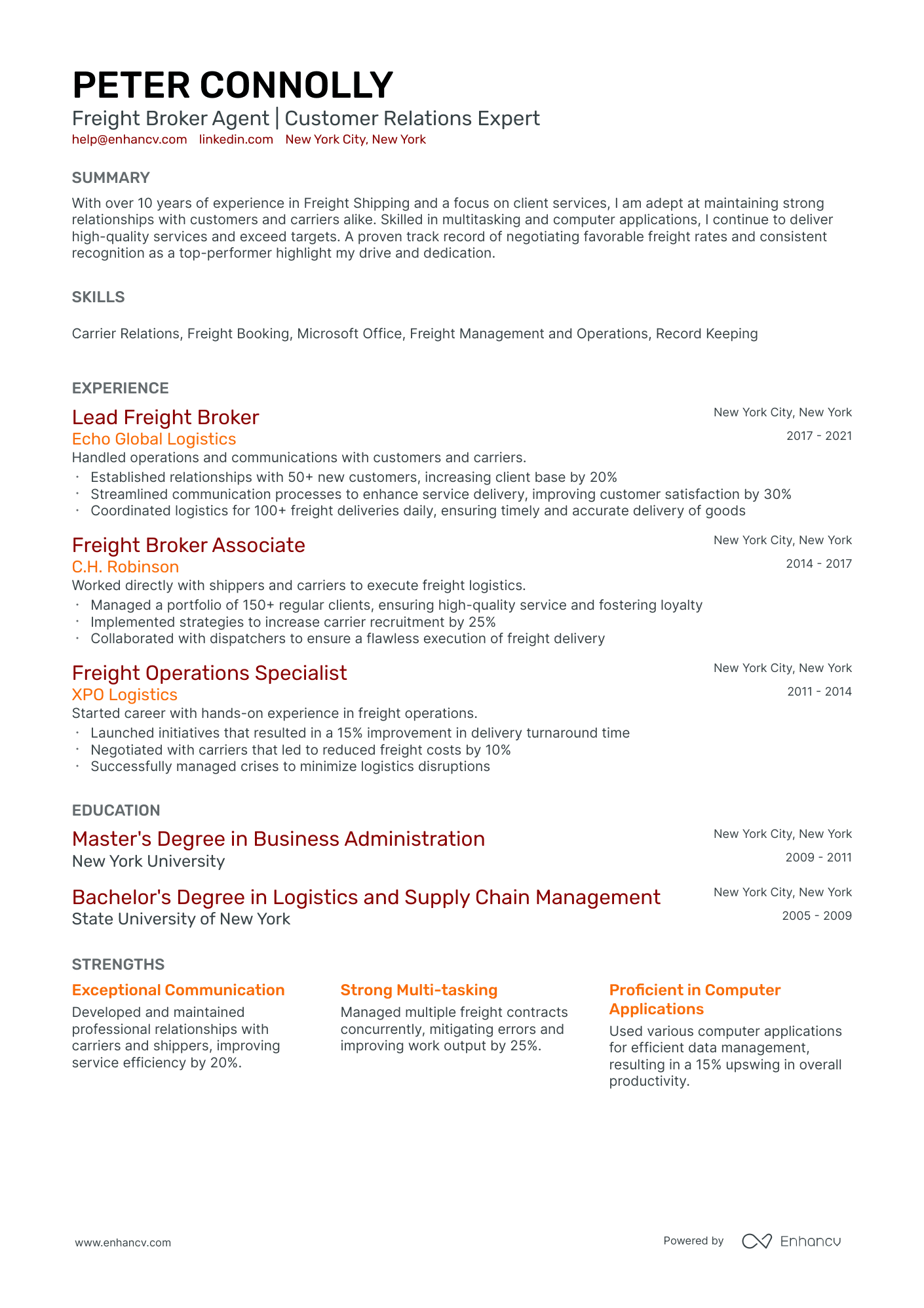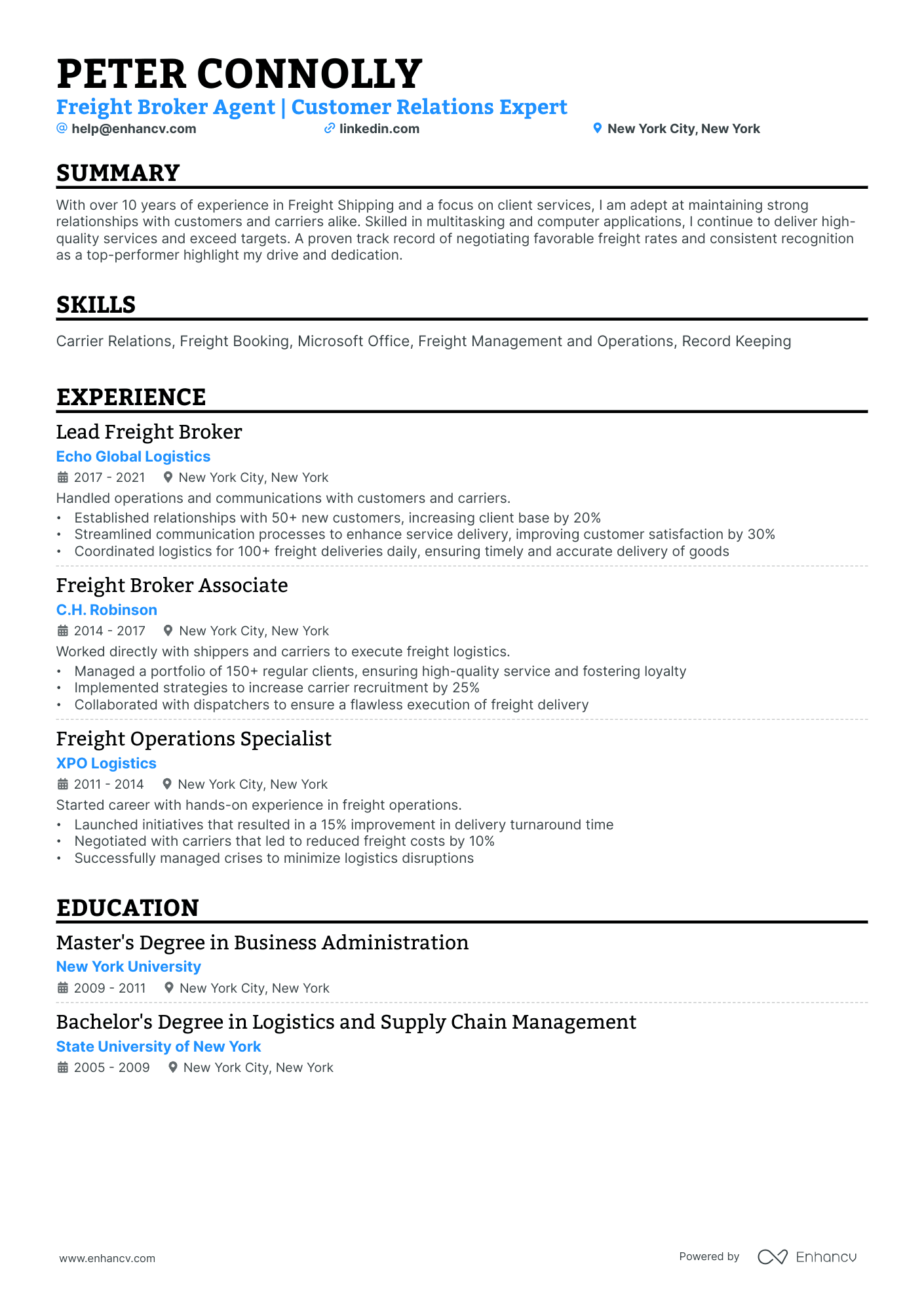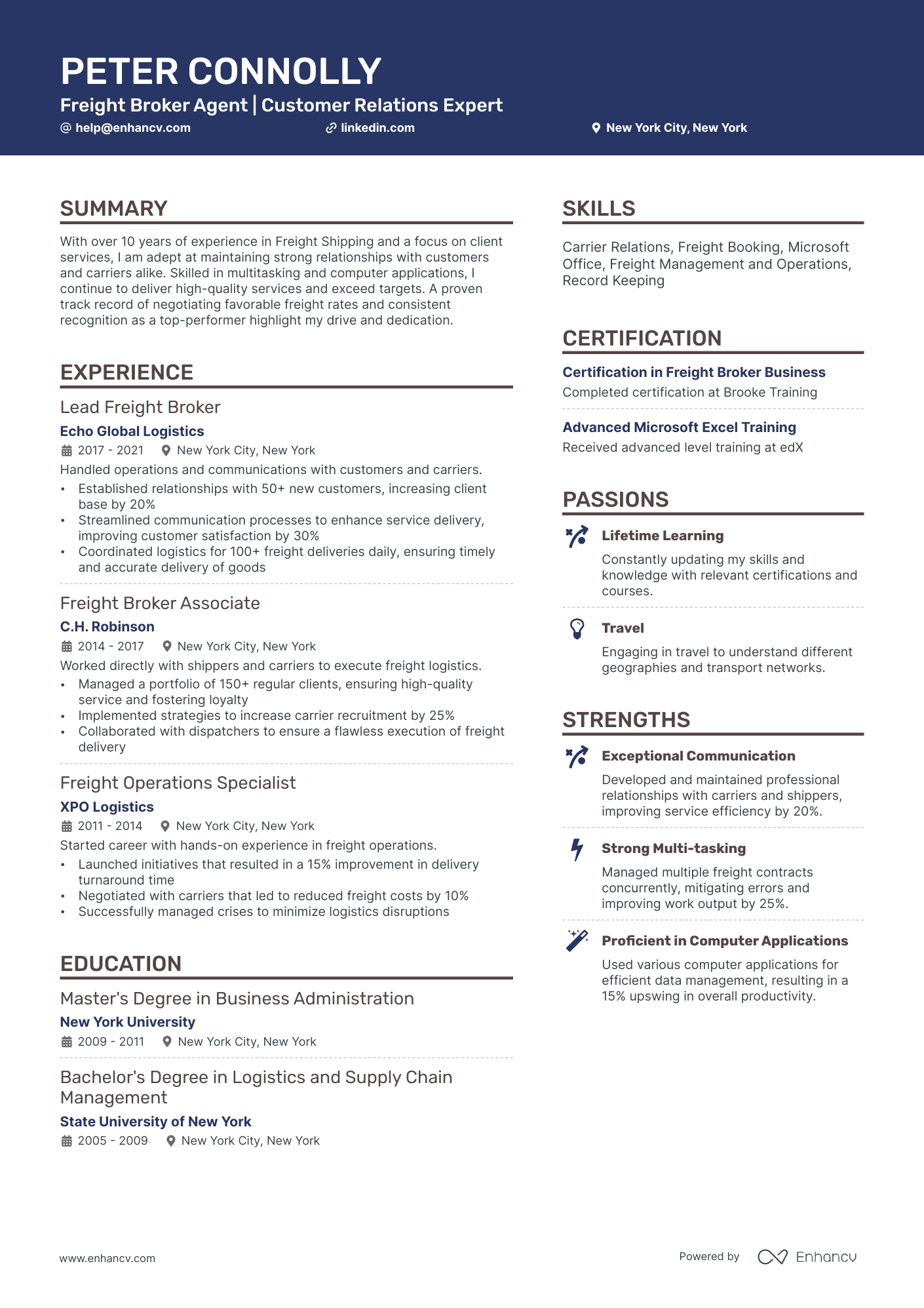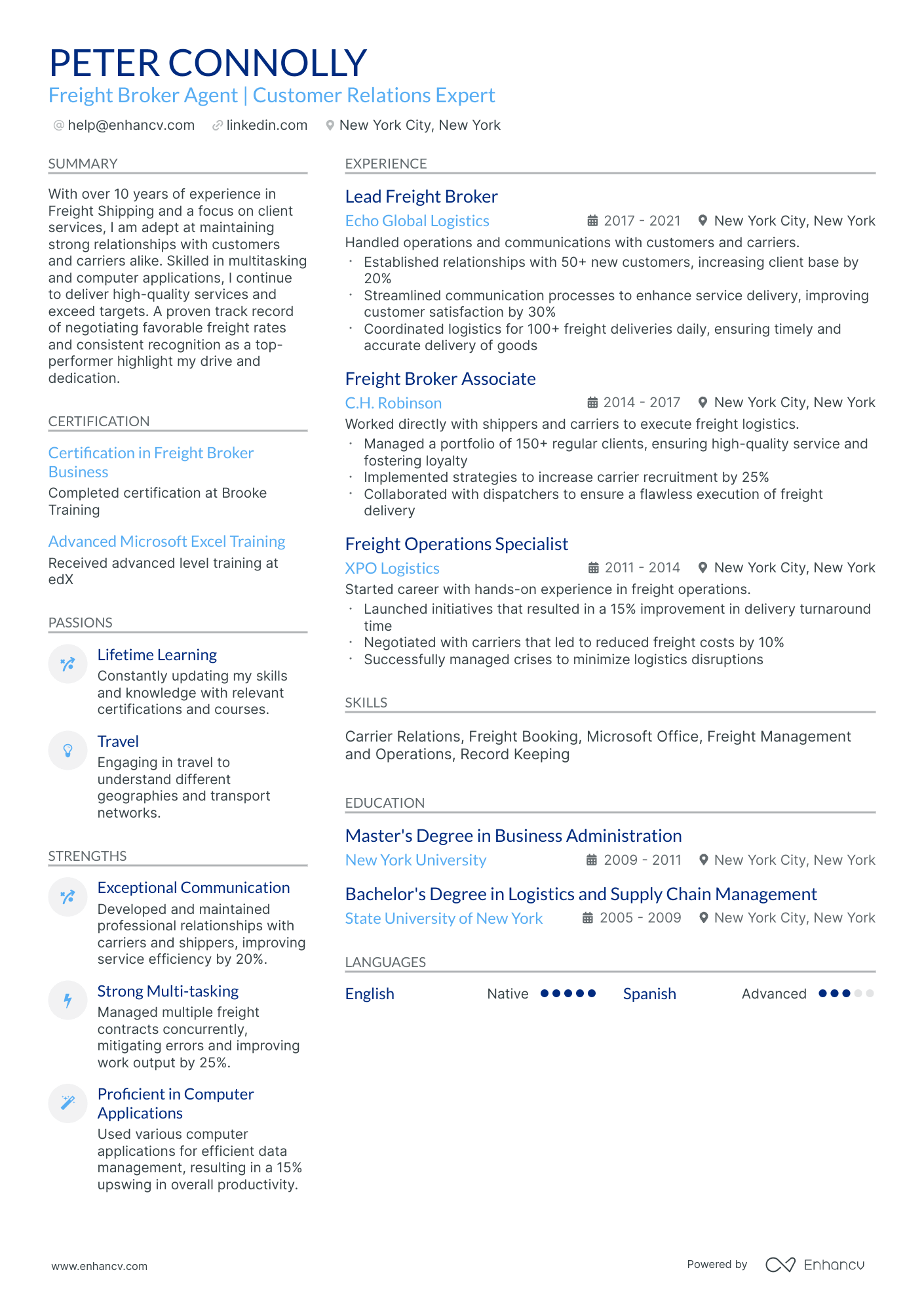Freight brokers often struggle with effectively showcasing their negotiation, communication skills, and industry knowledge on their resumes. Our guide can assist by providing specific examples and templates that highlight these key skills, translating your experiences into compelling resume content that potential employers will value.
Dive into our comprehensive guide to crafting a standout freight broker resume:
- Discover freight broker resume samples that have secured positions at top-tier companies.
- Master the aesthetics of your resume layout for maximum impact.
- Strategically present your achievements and skills across various resume sections.
- Convey to recruiters why you're the perfect fit for the job.
Recommended reads:
Tips for refining your freight broker resume format
The resume format sets the stage for your professional narrative. Ensure it:
- Adopts the reverse-chronological format, placing your most recent experiences at the forefront. This format is ideal for those with relevant and up-to-date experience.
- Features a clear headline, making it straightforward for recruiters to access your contact details, portfolio, or current role.
- Stays concise, ideally spanning no more than two pages, focusing on relevant experiences and skills.
- Maintains its layout by being saved as a PDF, ensuring compatibility with Applicant Tracking Systems (ATS).
Upload your resume
Drop your resume here or choose a file. PDF & DOCX only. Max 2MB file size.
Pro tip
Keep your freight broker resume clear and concise. Top professionals narrate their career stories while highlighting their strengths.
Key sections to include in your freight broker resume are:
- The header - with your contact details (like email and phone number), a link to your portfolio, and a headline.
- The summary (or objective) - highlighting the high points of your career so far.
- The experience section - limit yourself to six bullets per role to focus on specific results.
- The skills list - offering a balanced mix of your personal and professional talents.
- Education and certification - displaying your most relevant degrees and certificates for the freight broker role.
What recruiters want to see on your resume:
- Industry Knowledge: Familiarity with freight transportation, logistics management, and regulations unique to the industry.
- Negotiation Skills: Demonstrated ability in negotiating contracts with carriers, including pricing, logistics, and terms of shipment.
- Customer Service: Proven track record of maintaining strong relationships with clients and carriers, resolving disputes and issues effectively.
- Technical Proficiency: Experience with freight management software, databases, and other relevant technology tools for efficient job execution.
- Problem-Solving Abilities: Skill in mitigating risks, solving complex logistical problems, and making quick decisions under pressure.
Recommended reads:
How to create the cornerstone experience section of your freight broker resume
A meticulously crafted freight broker resume experience section is a recruiter's delight. This segment not only responds to job criteria but also throws light on your technical expertise and character.
To craft an impactful experience section:
- Highlight roles directly related to the position in question.
- Pair each role or task with a metric that quantifies your achievements.
- Chronicle your freight broker career progression, illustrating your dedication and growth in the domain.
- For each role, elucidate challenges faced, strategies employed, and the broader organizational impact.
Examine the following freight broker samples to discern how seasoned professionals have articulated their experiences:
- Managed freight transportation operations for diverse clients, negotiating rates and securing cost-effective shipping solutions.
- Developed and maintained relationships with carriers, resulting in a 20% increase in available capacity.
- Coordinated logistics for high-volume shipments, ensuring on-time delivery of goods and optimizing efficiency.
- Utilized industry software and technology to track shipments, monitor inventory levels, and generate reports.
- Led a team of freight brokers, overseeing daily operations and providing guidance on complex logistics challenges.
- Negotiated contracts with carriers, achieving an average cost reduction of 15% per shipment.
- Implemented process improvements that reduced transportation lead time by 25%.
- Collaborated with clients to develop customized shipping strategies, resulting in improved supply chain efficiency.
- Sourced and contracted reliable carriers for domestic and international freight transportation.
- Managed a portfolio of key accounts, consistently meeting or exceeding customer satisfaction targets.
- Implemented a real-time tracking system, providing clients with visibility into their shipments at all times.
- Resolved transportation-related issues and provided exceptional customer service to ensure client retention.
- Developed and executed comprehensive freight brokerage strategies to expand the company's client base.
- Analyzed market trends and negotiated favorable rates with carriers, resulting in cost savings of 10%.
- Managed complex freight projects, coordinating multi-modal transportation and overseeing customs clearance.
- Implemented a CRM system to streamline communication and improve customer relationship management.
- Ongoing: Responsible for end-to-end freight brokerage operations, ensuring timely and efficient delivery of goods.
- Utilized advanced analytics tools to optimize shipping routes, reducing transportation costs by 15%.
- Collaborated with cross-functional teams to implement automated processes, improving operational efficiency.
- Led negotiations with carriers and maintained strong relationships, resulting in improved service levels.
- Coordinated the movement of oversized and specialized shipments, including obtaining necessary permits and escorts.
- Managed a portfolio of high-value accounts, achieving a 30% increase in revenue through upselling and cross-selling.
- Developed customized logistics solutions for clients, optimizing transportation routes and reducing transit times.
- Implemented a tracking system integrated with GPS technology, enabling real-time visibility of shipments.
- Led a team of freight brokers and coordinated daily operations to ensure efficient and reliable service.
- Negotiated contracts with carriers and implemented performance metrics resulting in an 18% decrease in transit time.
- Developed and executed strategic marketing campaigns, contributing to a 25% increase in customer acquisition.
- Collaborated with software developers to implement a customized freight management system for improved workflow.
- Established relationships with local carriers, expanding the company's network and ensuring reliable transportation services.
- Managed all documentation and compliance requirements for domestic and international shipments.
- Coordinated logistics for time-critical deliveries, meeting tight deadlines and minimizing disruptions.
- Implemented cost-saving initiatives, resulting in a 15% reduction in transportation expenses.
- Oversaw a team of freight brokers, providing training, guidance, and performance evaluations.
- Developed and executed strategic partnerships with carriers, expanding service offerings and increasing customer satisfaction.
- Implemented a centralized database for tracking and managing shipments, reducing errors by 20%.
- Led process improvement initiatives, resulting in a 30% reduction in order processing time and improved efficiency.
- Collaborated with clients to understand their logistics needs and provided tailored freight solutions.
- Negotiated rates and contracts with carriers, resulting in a 12% decrease in transportation costs.
- Managed transportation-related claims and disputes, ensuring timely resolution and customer satisfaction.
- Developed and implemented standard operating procedures to streamline operations and improve service quality.
The following content includes information from "O*NET OnLine" by the U.S. Department of Labor, Employment and Training Administration (USDOL/ETA). Used under the CC BY 4.0 license. The data represents the top responsibilities present on the task lists for freight broker professionals.
Top Responsibilities for Freight Broker:
- Answer customers' questions about products, prices, availability, product uses, and credit terms.
- Recommend products to customers, based on customers' needs and interests.
- Estimate or quote prices, credit or contract terms, warranties, and delivery dates.
- Consult with clients after sales or contract signings to resolve problems and to provide ongoing support.
- Prepare sales contracts and order forms.
- Provide customers with product samples and catalogs.
- Monitor market conditions, product innovations, and competitors' products, prices, and sales.
- Perform administrative duties, such as preparing sales budgets and reports, keeping sales records, and filing expense account reports.
- Contact regular and prospective customers to demonstrate products, explain product features, and solicit orders.
- Identify prospective customers by using business directories, following leads from existing clients, participating in organizations and clubs, and attending trade shows and conferences.
Quantifying impact on your resume
<ul>
Building a freight broker resume when experience is sparse
If you're light on relevant experience, consider highlighting:
- Short-term roles or internships undertaken during your academic years.
- Contractual roles, emphasizing their relevance and the outcomes achieved.
- Alternative resume formats, such as functional or hybrid, that spotlight your skills.
- Research roles, especially if they involved significant projects or if your contribution was pivotal to the project's success.
Recommended reads:
Pro tip
Ensure your freight broker experience descriptions resonate with both tech-savvy and non-tech audiences. Adopting a consistent format, such as task-action-result, can lend clarity and coherence to your experience section.
Decoding the essence of your freight broker resume: hard and soft skills
Every job description communicates the desired hard and soft skills. These skills are the backbone of your application.
Hard skills are your tangible, technical proficiencies, often validated through certifications or hands-on experience. On the other hand, soft skills reflect your interpersonal abilities and how you navigate diverse work environments.
To effectively spotlight these skills on your resume:
- Create a distinct section for technical skills, listing the most relevant ones for the job.
- Highlight your strengths by weaving in achievements that underscore specific skills.
- Strike a balance between hard and soft skills to present a well-rounded profile.
- If multilingual, include a language proficiency section, emphasizing the interpersonal advantages it brings.
Stay tuned for a deep dive into the most in-demand hard and soft skills in the industry.
Top skills for your freight broker resume:
Freight Management Software
TMS (Transportation Management Systems)
CRM Software
Load Boards
Routing Software
GPS Tracking Systems
EDI (Electronic Data Interchange)
Accounting Software
Data Analysis Tools
Carrier Management Systems
Negotiation
Communication
Problem-Solving
Time Management
Customer Service
Attention to Detail
Adaptability
Teamwork
Interpersonal Skills
Critical Thinking
Next, you will find information on the top technologies for freight broker professonals from "O*NET OnLine" by the U.S. Department of Labor, Employment and Training Administration (USDOL/ETA). Used under the CC BY 4.0 license.
Top technologies for Freight Broker’s resume:
- Oracle Eloqua
- Salesforce software
- Blackboard software
- Yardi software
- Microsoft Dynamics
- Oracle PeopleSoft
Pro tip
When detailing your skills, always back them up with tangible evidence, be it quantifiable results or certifications.
Highlighting freight broker-specific certifications and education
Your resume education section can be a treasure trove of skills and experiences relevant to the role. Here are the best practices when it comes to featuring it on your resume:
- Highlight advanced qualifications, detailing the institution and duration.
- If you're currently pursuing a degree, mention your expected graduation date.
- Consider omitting unrelated degrees.
- If your academic journey boasts significant achievements, especially in research, elaborate on them.
What's more, shocasing relevant industry certifications can bolster your credibility, even if you lack extensive work experience.
To effectively present your certifications:
- Place pivotal industry certifications prominently in a dedicated section.
- If a certification is particularly impressive, consider featuring it near your name or within the header, summary, or objective.
- Provide details, where relevant, to underscore alignment with the role.
- Recent certifications should be given advantage, as they show your up-to-date knowledge.
Both education and certification sections highlight your commitment to professional growth, a trait valued by employers. Below, explore some of the most current and sought-after freight broker certifications to enhance your application:
Best certifications to list on your resume
- Customs Broker License - U.S. Customs and Border Protection
- Supply Chain Professional (CSCP) Certification - Association for Supply Chain Management (ASCM)
- Certified in Production and Inventory Management (CPIM) - Association for Supply Chain Management (ASCM)
Pro tip
The reputation of the institution or organization granting your certification or degree can bolster your credibility. Prioritize recognized and respected credentials.
Recommended reads:
Best practices for your freight broker resume summary or objective
How do you know if you should include a resume summary or a resume objective?
- Resume summaries are ideal for freight broker professionals with more experience, who'd like to give a quick glimpse of their biggest career achievements in the top one-third of their resumes.
- On the other hand, resume objectives serve as a road map to the applicant's aspirations. Candidates use the objective as the North Star of their career (or, how they see themselves in the role in the next few years).
Both could be the perfect fit for your freight broker resume, depending on your experience.
Here's how candidates for the freight broker job structure their summaries and objectives.
Resume summary and objective examples for a freight broker resume
Extra sections to include in your freight broker resume
What should you do if you happen to have some space left on your resume, and want to highlight other aspects of your profile that you deem are relevant to the role?
Add to your freight broker resume some of these personal and professional sections:
- Passions/Interests - to detail how you spend both your personal and professional time, invested in various hobbies;
- Awards - to present those niche accolades that make your experience unique;
- Publications - an excellent choice for professionals, who have just graduated from university or are used to a more academic setting;
- < a href="https://enhancv.com/blog/volunteering-on-resume/"> Volunteering - your footprint within your local (or national/ international) community.
Key takeaways
- Your resume's layout should be both visually appealing and content-rich.
- Emphasize achievements that resonate with the job's requirements.
- Detail your skills, both technical and interpersonal, with real-world examples.
- Ensure the top section of your resume provides a clear snapshot of who you are and what you offer.
- When detailing experience, focus on tasks, actions, and their outcomes.
